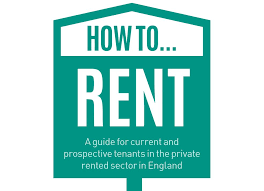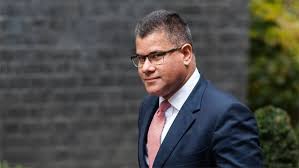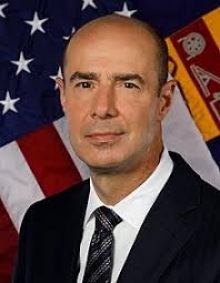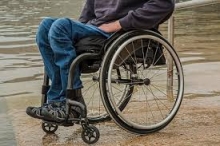Work TV
Watch our TV Channel dedicated to the ‘World of Work’. Explore our video library for informative videos featuring career opportunities at leading companies, franchising opportunities, further education and recruitment professions and their services.
Simon Collyer
ABC Founder Simon Collyer Is Appearing with City Talk Presenter Nita Jhummu Chelmsford Community Radio on Monday 14th
RADIO APPEARANCE – ABC Founder Simon Collyer is appearing on Chelmsford Community Radio on Monday 14th on the City Talk program, with the award-winning presenter, Nita Jhummu.
City Talk is every Monday 8 pm to 10 pm Nita talks about a range of subjects with guests who this year have included, The Leader of Chelmsford Council, the new Mayor of Chelmsford, local businesspeople, and local historians to name just a few.
Simon will be talking about a range of topic relating to people on social security and state pensions and he will be featuring Universal Credit issues. Later Simon with be talking about his own life and his experiences, competitive sailing in the demanding Olympic 470 high performance two-man racing dinghy, sailed at the Olympic Games.
Brian McGovern co-hosts City Talk who is also the co-founder of homelessness charity Cool to Be Kind, who is running the Rucksack Project this Christmas.
Simon Collyer is area ambassador for Colchester for the popular In Your Area local news website founded by Reach Plc the UK’s largest media group and has been speaking in schools with a talk called Human Potential with some help from Team INEO the British Americas Cup Challenge who is now in New Zealand preparing for the The 36th America's Cup with a warmup series starting this week in Auckland leading to the Cup finals match next March: www.americascup.com
Simon has appeared on BBC Essex (five times this year), talkRADIO (weekend breakfast show), Future Radio and on RT TV (fourth time) as well as previously the British Forces Broadcasting, BBC Look East, and more including print media.
The ABC provides News, Inspiration and Signposting say Simon for strugglers and those looking to get back into the job market. The ABC is gaining a following in the United States and even in Russia.
You can listen online at www.chelmsfordcommunityradio.com or 104.4 FM on your radio. Click below:
ABC Comment, have your say below:

The Olympic 470 Class
New 'How to Rent' Guide Released By UK Government
RENTING - A new ‘How to Rent’ guide has been released by Government – with landlords reminded they MUST serve this version at the start of any new tenancy or renewal.
Rules were brought in five years ago making it mandatory for landlords to provide the latest version of 'How to rent: a checklist for renting in England' to their tenants when the first tenancy starts - and on renewal if there has been an update to the contents.
ABC Comment, have your say below:


'How to Rent Guide' below:

Housing, Communities and Local Government Evidence Session on Rough Sleeping Monday 14 December, 4.00pm
PARLIAMENT - Housing, Communities and Local Government
Evidence session on the Covid-19 pandemic, homelessness and rough sleeping
Monday 14 December, 4.00pm
Watch the session live at www.parliamentlive.tv
The Housing, Communities and Local Government Committee resumes its work on the impact of the Covid-19 pandemic on homelessness and the private rented sector on Monday 14 December when it takes evidence from witnesses representing Shelter, Citizens Advice and the National Residential Landlords Association.
In a report published earlier this year, the Housing, Communities and Local Government Committee called on the Government to build on successful efforts to provide accommodation for rough sleepers and homeless people during the Covid-19 pandemic by providing the long-term funding necessary to end the accommodation crisis once and for all. It further warned of a looming ‘cliff edge’ of evictions in the private rented sector once the eviction ban came to an end due to the numbers of people in rent arears as a result of the economic impact of the pandemic.
In this session the Committee will seek an update on how effective Government support has been in supporting individuals in the private rented sector or who are homeless, including how the legal system around evictions is operating. It will also look at what long-term strategies will need to be put in place to support both groups in the long-term, once current measures expire.
Witness schedule
From 4.00pm:
- Liz Davies, Joint Head of Chamber, Garden Court Chambers
- Simon Mullings, Co-Chair, Housing Law Practitioners Association
- Giles Peaker, Partner, Anthony Gold Solicitors
From 5.00pm:
- Ben Beadle, Chief Executive, National Residential Landlords Association
- Dr Cecil Sagoe, Policy Officer, Shelter
- Joe Lane, Principal Policy Manager, Citizens Advice
- Cllr Rachel Blake, Member of the Environment, Economy, Housing and Transport Board, Local Government Association (LGA)
ABC Comment, have your say below:

The US Social Security System
US BENEFITS - U.S. Census Bureau data shows that the average retirement age in the United States comes in at about age 65 for men and 63 for women. Age 63, however, would actually be considered an early retirement age, at least as far as how your Social Security and Medicare benefits are determined.
In fact, data reveals that people experience an average retirement length of approximately 20 years.
American retirement expectations may consider this average retirement length from the Census.
While young Americans aged 18-29 expect to retire at 63, a 2018 Gallup survey says that the average American predicts retirement at age 66.
The average retirement age varies by state. In states with a higher cost of living, such as the New England area, the average retirement age is higher.
People work longer so they can afford to retire in their state. In states with high unemployment, the average retirement age is actually lower. People who can't find work must take retirement earlier than they desired. One of the areas with the earliest retirement age is the Appalachian region.
ABC Comment, have your say below:

Christmas Benefits Payments in the UK
CHRISTMAS PAYMENTS - The Government has published payment dates for state benefits over the festival period in England.
All benefits apart from Universal Credit due to be paid on Christmas Eve, Christmas Day or Bank Holiday Monday December 28 will be paid on December 23.
All Universal Credit payments due between Christmas Eve and December 28 inclusive will be made on Christmas Eve.
Payments of all benefits due on December 29, December 30 or New Year's Eve will be made on those days.
All benefit payments due on New Year's Day will be made on New Year's Eve.
The Department of Work and Pensions has also announced that its offices and phone lines will be closed on Christmas Eve, Christmas Day, December 28 and New Year's Day.
ABC Comment, have your say below:

US November 2020 Employment Situation Report
WASHINGTON, DC – U.S. Secretary of Labor Eugene Scalia issued the following statement regarding the November 2020 Employment Situation Report:
“The economy continued to add jobs in November, with a 344,000 increase in private sector payrolls and labor demand continuing to grow in most sectors. However, jobs were lost in retail and food and beverage establishments in November, and a number of workers pulled away from the labor force amid rising coronavirus cases. We know from State-by-State data released two weeks ago that the employment situation varies significantly by State: in October, half the States were at 6% unemployment or lower, but two of the largest states—California and New York—were substantially above 9% that month. At 6.7%, the unemployment rate is lower than it was for the first five years of the last Administration following the Great Recession.
ABC Comment, have your say below:

Government to Consult on Crackdown On Unfair Employment Clauses In A Boost For Low Paid Workers
EMPLOYMENT CHANGES - New proposed measures to allow workers’ greater freedom to find new or additional work have been unveiled by Business Secretary Alok Sharma today (4 December 2020).
The consultations will look at reforming the use of exclusivity and non-compete clauses.
In a major win for the UK’s lowest paid workers, the government will consult on banning the use of exclusivity clauses in contracts, which prevent workers from taking on additional work with other employers, This would apply to a worker’s who’s guaranteed weekly income is below the Lower Earnings Limit, currently £120 a week.
This change will put more power into the hands of an estimated 1.8 million low paid workers across the UK to top-up their income with additional work if they want to – ending an unfair penalty on hardworking Britons who want the freedom and flexibility to make a living and support their families.
It will also greatly expand the pool of talent available for businesses who rely on part-time and flexible workers, as those already in low-paid part-time employment will no longer be bound by restrictive contracts.
Today’s plans also look to reform the use of non-compete clauses, which can prevent individuals from starting up or joining competing businesses after they leave a position. The move will ensure talented individuals have the freedom to apply their skills in another role if they wish while unleashing a wave of new start-ups across the country.
- Proposed crackdown on restrictive employment contracts will ensure up to 1.8 million low paid workers across the UK can pick up extra work if they want to
- other reforms will remove unfair barriers that prevent workers in technology, legal and other sectors from starting up or joining competing businesses
- plans will give workers more freedom over where and when they work – helping millions boost their incomes during this difficult time

Image: Business Secretary Alok Sharma.
Business Secretary Alok Sharma said:
We want to ensure every worker has the freedom and flexibility to work in the way they want, where they want – whether that’s topping up their pay packet by taking on additional work, or being able to start their own business with the skills they’ve gained throughout their career.
Today’s reforms are another step on our path to making sure the UK is the best place in the world to work, start and grow a business as we build back better from the pandemic.
Plans involve introducing a mandatory compensation requirement for any employer that wishes to use non-compete clauses, ensuring that workers receive a fair settlement if they are restricted from joining or starting a business within their field of expertise. This aims to discourage the unnecessary and widespread use of non-compete clauses by employers.
The government is also seeking views on whether it is necessary to go further and ban non-compete clauses all together.
Exclusivity clauses were banned for workers on zero hours contracts, where employers are not obliged to provide any minimum working hours and the worker is not obliged to accept any work offered, in 2015.

Image: Andy Chamberlain, Director of Policy at IPSE.
Andy Chamberlain, Director of Policy at IPSE said:
It is a welcome step in the right direction that the government is consulting on ways to crack down on restrictive contracts.
Paring back restrictive contract features such as exclusivity and non-compete clauses should, we hope, help open up opportunities for the self-employed and support them in adapting to these challenging times.
The 2 proposed reforms form part of the government’s plans to build back better, ensuring the UK’s recovery from COVID-19 creates new jobs, increases competition and maximises opportunities for the most talented innovators, job creators and entrepreneurs in the UK.
View the 2 consultations:
- measures to reform post-termination non-compete clauses in contracts of employment
- measures to extend the ban on exclusivity clauses in contracts of employment
ABC Note: Other countries have also restricted exclusivity clauses in order to stimulate innovation, including Germany and France.
In Germany, exclusivity clauses are not used in employment contracts, and taking on an additional job (as long as it is not in competition to your first employer) is never prohibited.
Germany have also created mini-jobs, to promote higher employment rates through income tax-free marginal employment, with workers making at most €450 a month in part-time jobs (under the limit for social security contributions and exempt from income tax). All German industries are allowed to offer mini job contracts, but the most common types of mini jobs are in the fields of catering, retail, and domestic work.
ABC Comment, have your say below:

National Express Are Running a Limited Network Over Christmas
NATIONAL EXPRESS - If you are thinking of travelling over Christmas, please take this into consideration.
There will be less demand than normal for coach travel but there is still a need, particularly over the festive season with no trains running on Christmas Day and planned engineering works on the railways. National Express will be running a limited network with a focus on major cities, towns, and airports but they will monitor bookings so wherever possible, the make sure people can get where they need to be. The flexibility of coach travel means we have the ability to increase capacity quickly and safely in line with demand and any Government guidance.
Do check out the National Express website: https://www.nationalexpress.com
Do not travel if you are feeling unwell and remember you are required by law to wear a face covering when on public transport (unless exempt). This short animation below shows the steps National Express have taken to keep you and their teams safe and how you can help.

Image: National Express.
ABC Comment, have your say below:

Rishi Sunak's Refusal to Keep The £20 Universal Credit Increase Will "Leave Millions of People With Crippling Uncertainty And Fear Over Christmas," More Than 60 Organisations Said
UNIVERSAL CREDIT - Emergency benefits increase saved 700,000 from poverty, study shows.
The warning comes as a new Legatum Institute report shows the emergency £20-per-week increases to both benefits brought in at the start of the pandemic prevented 690,000 people falling into poverty this winter.
Campaigners and anti-poverty experts have made repeated calls for the increase to be made permanent beyond April. But Chancellor Rishi Sunak did not announce such a policy change in last week’s Spending Review.
“We should be proud of our country’s decision to protect those on the lowest incomes through our social security system – it’s the right thing to do,” Joseph Rowntree Foundation (JRF) director Helen Barnard said.
“But it makes it all the more disappointing that the Chancellor has stayed silent on whether this lifeline will stay in place beyond April, leaving millions to wait out the winter in fear and uncertainty. There is no conceivable scenario in which this support will not be needed, and inaction risks a sharp rise in poverty.”
The Legatum Institute – the think tank run by Conservative peer Baroness Philippa Stroud – said UK poverty was “significant” and long-term.
More than one in five people were living in poverty before the pandemic – amounting to 14.4 million people. This has “hardly changed over the last 20 years,” according to the study.
The Covid-19 crisis pushed 440,000 more people into poverty by summer this year, they added. But attempts to mitigate the pandemic’s financial fallout protected hundreds of thousands from the same hardship. This included the £20 increase and suspension of the minimum income floor for self-employed Universal Credit claimants.
The Chancellor’s refusal to maintain that protection was a “glaring omission” in his Spending Review announcement. That was according to coalition organisations like JRF, Child Poverty Action Group, the Independent Food Aid Network and Oxfam.
It will damage the local economies of parts of the country which were already lagging behind the rest of the UK
“We are deeply concerned that the Government has chosen to leave millions of people with crippling uncertainty and fear over Christmas,” they said.
“Costs have shot up; job opportunities are scarce and our economy will still be in deep recession next Spring.”
Both the Work and Pensions Committee and Lords Economic Affairs Committee have backed keeping the £20 increase in their respective calls for Universal Credit reform.
“The removal of this support would not only be immoral, but it will also damage the UK’s recovery,” the coalition’s statement continued. “Cutting support for those on the lowest incomes will reduce demand in the economy at a time when we are trying to secure a recovery. It will damage local economies of parts of the country which were already lagging behind the rest of the UK.”
As well as making the £20 increase permanent, campaigners are demanding the Government extend it to other claimants. People on Employment and Support Allowance, Jobseeker’s Allowance and Income Support did not receive the £20 increase. These payments, known as legacy benefits, are mostly claimed by disabled people.
Earlier this month The Big Issue heard from Lee, 62, who has an autoimmune disease that affects her organs. She said ministers “haven’t really taken into account how disabled people live” when making decisions about their benefits.
Changes to legacy benefit rates take “months” to introduce, according to the coalition. This is “precisely why we needed to see a decision now so this support could be in place by April.”
It is “not too late for the Chancellor to do the right thing,” said JRF’s Barnard. She urged the Government to c0mmit to making the £20 increase permanent and extend it to people receiving legacy benefits.
A Government spokesperson said: “We are wholly committed to supporting disabled people through the pandemic.”
The spokesperson pointed to welfare support boosted by £9.3 billion and the Covid Winter Support Package. Ministers have also given £3.7 billion to councils to ease pressure on local services, they said.
In this new short film, the BBC’s special correspondent, Ed Thomas, spent four days with a community in Burnley facing severe economic hardship. The film highlights the impact of COVID-19 on people living in poverty. It's unthinkable that the Government would remove the £20 uplift to Universal Credit when people are already being pushed to the brink.
The poorest communities have been hit hardest during the Covid-19 pandemic.
BBC analysis shows the death rate from all causes between April and June this year in the most deprived areas was nearly double that of deaths in the least deprived parts of England.
The majority of the top 10 cities and towns with the highest death rates were in the north of England.
The BBC’s special correspondent Ed Thomas spent four days with a community in Burnley facing severe economic hardship.
The government says it's providing funding for local authorities to deliver services, including £170m to help families stay warm and well fed, millions for food aid charities and £220m for children through the Holiday Activities and Food programme.
"We recognise how difficult restrictions can be, particularly for those areas that have been under restrictions for so long," a spokesperson said.

ABC Note: The Legatum Institute is a London-based think-tank with a global vision: to see all people lifted out of poverty. Their mission is to create the pathways from poverty to prosperity, by fostering Open Economies, Inclusive Societies and Empowered People.
ABC Comment have your say below:

International Day of Persons with Disabilities
DISABILITIES - Today is the the International Day of Persons with Disabilities with a week-long programme from 25 November to 3 December 2020 under the theme: “Building back better: towards an inclusive, accessible and sustainable post COVID-19 world by, for and with persons with disabilities”.
The Convention on the Rights of People with Disabilities is an international human rights treaty of the United Nations intended to protect the rights and dignity of people with disabilities.
Since its inception in 1945, the United Nations (UN) has outlined and reiterated its commitment to calling for the creation of inclusive, accessible and sustainable societies and communities – most notably with the adoption of the Universal Declaration of Human Rights in 1948. Over time, the UN has honed its focus on promoting the well-being and welfare of people living with disabilities, and in 1992 called for an international day of celebration for people living with disabilities to be held on December 3 each year.
International Day of People with Disabilities is not owned by the UN – it is owned by everyone: people, organisations, agencies, charities, places of learning – all of whom have a vital role to play in identifying and addressing discrimination, marginalization, exclusion and inaccessibility that many people living with disabilities face. International Day of People with Disabilities is one day on the international calendar, yet it symbolizes the actions we should take every day, in order to create diverse and accepting communities.

Image: United Nations Building.
ABC Comment, have your say below:


























